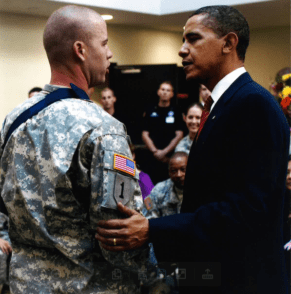
Judicial Watch: Grieving Father Sues Secretaries of Defense and Army to Award Purple Heart to Sgt. Joshua A. Berry for Injuries He Sustained in 2009 Terrorist Attack at Fort Hood, Texas
(Washington, DC) – Judicial Watch today announced it filed a lawsuit on behalf of Howard M. Berry, the father of the late U.S. Army Sgt. Joshua A. Berry, against the Secretaries of Defense and Army to award the Purple Heart to Sgt. Berry for injuries sustained in the 2009 international terrorist attack at Fort Hood, Texas (Howard M. Berry v. Ryan D. McCarthy, Acting Secretary of the Army and James Mattis, Secretary of Defense (No. 1:17-cv-02112)).

Judicial Watch points out:
Following the Fort Hood attack, the Secretary of Defense declined to recognize the mass shooting as an international terrorist attack against the United States. Instead, the attack was characterized as “workplace violence.” As a result, active duty servicemembers injured in the attack were ineligible for the Purple Heart, among other awards and benefits.
In response, Congress enacted legislation in 2014 mandating that servicemembers killed or wounded in an attack targeting members of the armed forces and carried out by an individual in communication with and inspired or motivated by a foreign terrorist organization be eligible for the Purple Heart….
The new lawsuit describes how Sgt. Berry was injured during the Ft. Hood terrorist attack:
On November 5, 2009, U.S. Army Major Nidal Hasan (“Hasan”) opened fire at Fort Hood, Texas, killing thirteen people and injuring more than 30 servicemembers and civilians. Sgt. Berry was among the servicemembers injured in the attack. Sgt. Berry was assigned to Headquarters and Headquarters Battery, 1st Battalion, 6th Field Artillery, at Fort Hood. He had deployed to Afghanistan for approximately a year in June 2008 and was at Fort Hood as part of a transition program following his return from deployment. He was one of the last soldiers awaiting redeployment to Fort Knox at the time of the attack.
The briefing room in Building 42004 had a set of metal double doors leading to the outside. In witness statements given to the U.S. Army Criminal Investigative Command (“CID”) and in a separate statement given to a Texas Ranger, Sgt. Berry estimated that Hasan fired 30-40 rounds outside Building 42004. Sgt. Berry told those around him to get down on the floor and stay away from the doors and windows. When Sgt. Berry heard gunshots hit the metal doors near him, he leaped over a desk to take cover and, in so doing, dislocated his left shoulder. He then heard Hasan trying to kick in the doors. According to a witness statement from another individual, Hasan fired three rounds at the briefing room doors.
Investigative photographs and sketches of the SRP center show the layout of buildings and the location of shell casings from the shots fired by Hasan. The photographs and sketches show a number of shell casings around the metal doors of the briefing room where Sgt. Berry was located during the shooting.
Following the attack, Sgt. Berry was admitted to the Carl R. Darnall Army Medical Center at Fort Hood on November 5, 2009, where his dislocated shoulder was surgically repaired.
The attending physician who admitted Sgt. Berry found that Sgt. Berry’s injury occurred during the mass shooting at the SRP center.
Sgt. Berry’s commander found the injury to have been incurred in the line of duty and documented that Sgt. Berry was a casualty of the mass shooting at the SRP center.
On November 6, 2009, Sgt. Berry was entered into the U.S. Army casualty reporting system with a diagnosis of shoulder dislocation as a result of the mass shooting at the SRP center.
A photograph of Sgt. Berry meeting with President Barack Obama at a November 10, 2009 memorial service at Fort Hood, included herewith as Exhibit A, shows Sgt. Berry’s left arm in a sling.
By memorandum dated December 7, 2009, the Fort Hood Installation Adjutant General confirmed that Sgt. Berry’s shoulder dislocation occurred in the line of duty.
CID, the Texas Rangers, and the Federal Bureau of Investigation conducted a joint investigation of the shooting and subsequently found probable cause to believe Hasan committed the offense of attempted murder when he fired at Sgt. Berry.
On May 2, 2011, a Physical Evaluation Board found Sgt. Berry unfit for continued military service due to post-traumatic stress disorder, the shoulder injury received in the Fort Hood shooting, and degenerative arthritis of the spine. It recommended a combined disability rating of 80%.
On May 31, 2011, Sgt. Berry was released from active duty and placed on the temporary disability retired list.
On February 13, 2013, Sgt. Berry committed suicide. He was 36 years old. Sgt. Berry is survived by Plaintiff and a now 7-year old daughter.
At his August 2013 court martial, Hasan admitted to being influenced by Anwar Awlaki, chief propagandist for the al Qaeda in the Arabian Peninsula terrorist group.
On February 6, 2015, the Secretary of the Army announced that the Fort Hood attack met the criteria for awards of the Purple Heart. In its review of the mass shooting, the Army found sufficient evidence to conclude Hasan “was in communication with the foreign terrorist organization before the attack,” and that his radicalization and subsequent acts could be considered to have been “inspired or motivated by the foreign terrorist organization.”
The U.S. Army Decorations Board denied Mr. Berry’s application for a posthumous award of the Purple Heart to his son. In April 2015, the Army awarded the Purple Heart to 47 servicemembers injured in the Fort Hood attack. Sgt. Berry was not among them.
On April 17, 2016, a three-member panel of the Army Board for Correction of Military Records recommended that all Army records concerning Sgt. Berry be corrected by awarding Sgt. Berry the Purple Heart. The panel found “[t]here is no question that [Sgt. Berry]’s injury met the basic medical criteria for award of the [Purple Heart].”
In the lawsuit, Judicial Watch asks the court to declare the Secretary of the Army’s October 28, 2016, decision to be arbitrary, capricious, an abuse of discretion, and otherwise not in accordance with the law; to declare that the denial of Berry’s application was unsupported by evidence; and to prevent the Army from continuing to deny Sgt. Berry a Purple Heart.
“Sgt. Berry deserves the Purple Heart and the bureaucracy should stop obstructing his just cause,” said Judicial Watch President Tom Fitton. “Frankly, we can’t imagine that President Trump, President Obama or Secretary Mattis would disagree that Sgt. Berry should be posthumously awarded the Purple Heart for the injuries he sustained during the Ft. Hood attack.”
###

















